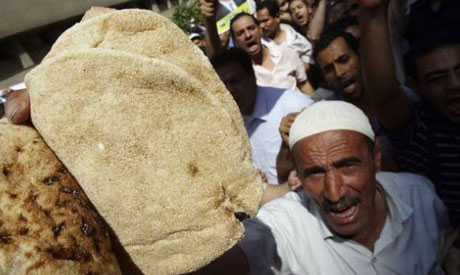
Egypt food protests - a thing of the past? IMF suggests more trouble could be on the way (Photo: Reuters)
The International Monetary Fund has painted a worrying picture for Egypt's economy, warning of negligible growth, unsustainable public finances and the inability of foreign investment to fill the gap.
Egypt is likely to see economic growth of just 1.5 per cent in 2011, the global body said in its World Economic Outlook released earlier this week.
It went on to project growth of around 2.5 per cent in 2012, underpinned by a slow recovery in investment.
The IMF's report divides the Middle East and North Africa region into oil exporters and oil importers, pegging the latter -- which include Egypt, Tunisia and Syria -- as likely to see the worst economic turmoil.
"For the oil exporters ... we expect them to have strong fiscal and current account balances, but the opposite holds true for countries that are importing commodities, and those undergoing very protracted political transition to stability," said Rupa Duttagupta, Deputy Division Chief of the IMF's World Economic Studies Division, during a press briefing on Tuesday.
Egypt, the world's largest importer of wheat, which relies on heavily subsidised energy to support a large proportion of its 84 million population, seems to match the description all too well.
The IMF report went on to call for a medium-term reorientation of fiscal policies to "attain poverty reduction and productive investment goals".
But it noted that pressure on governments like Egypt's to increase social spending and subsidies would place a strain on public finances wich would not be sustainable over the medium-term.
It also warned such actions "could further crowd out needed private investment, perpetuating the problems with job creation in the private sector."
In June, the Egyptian government rejected the offer of a $3 billion loan from the IMF after popular disapproval of the rumoured terms and conditions. Without such funding, Egypt will struggle to fill the gap, the report claimed.
"In terms of external financing in 2011, private capital inflows (chiefly foreign direct investment) will likely be insufficient to offset oil importers’ growing current account deficits, resulting in a drawdown of international reserve cushions," it said.
On Tuesday, Egypt's central bank said its gold reserves are at the same level as in August 2010, making them more valuable in real terms given 2011's hike in gold prices.
Egypt's net foreign reserves were valued at $35.527 billion in August 2010 but tumbled in the wake of the popular uprising that toppled longtime president Hosni Mubarak. They sat at $25.01 billion last month, according to figures on the central bank's website.
Syria's economy is also likely to take a beating this year, said the IMF, predicting a contraction of 2 per cent of its GDP.
The global body foresaw 3 per cent growth for the country before the uprising against Bashar Al-Assad's rule erupted in March.
Neighbouring Lebanon, which has strong business ties with Syria, will grow at a meagre 1.5 per cent, down from 7.5 per cent in 2011, the IMF added.
The Syrian economy has been hit by an oil export ban imposed by the EU in August, while tourism -- a source for 12 per cent of the country's revenues -- has dried up completely.
The government previously raised civil servants salaries and reduced oil product prices in a futile attemp to assuage public anger.
Short link: